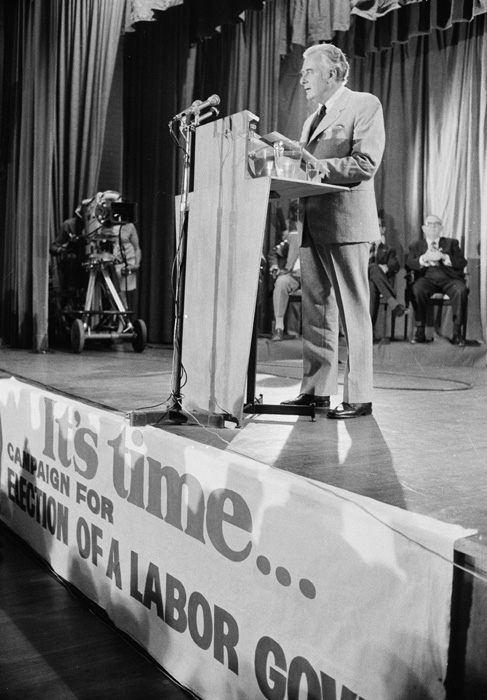In honour of the recent passing of Gough Whitlam, it’s time to take a look at the contribution of this notable Australian Prime Minister on Sydney and Sydneysiders across his lifetime.
Edward Gough Whitlam was the 21st Prime Minister of Australia from 1972 through to 1975. Melbourne-born and Canberra-raised, he moved to Sydney in 1935 to start his studies in law at the University of Sydney. After a stint in the armed forces during World War 2, he resumed his studies in 1945 and became a practising lawyer in 1947.

He joined the Darlinghurst branch of the Australian Labor Party (ALP) in 1945. He was elected to the seat of Werriwa in 1952, and remained as the local member until 1978. Whitlam and his young family initially settled in a home they built at Cronulla in the immediate post-war period, but they moved to Cabramatta in the 1950s, which was by then in the heartland of Whitlam’s electorate.
Whitlam was the deputy leader of the ALP in 1960–67 and the leader of the opposition in 1967–72. He was elected as the 21st Australian Prime Minister in 1972.
Whitlam made significant contributions to the everyday lives of Australians through an ambitious reform agenda across health, housing, education and regional development. His government’s enduring legacy for the people of inner Sydney was an agreement to provide social housing in Glebe and Woolloomooloo. Whitlam Square, at the north-west corner of Hyde Park, was formally named in his honour in 1983.
But it was western Sydney where Whitlam left the greatest mark. He represented the seat of Werriwa for over 25 years, which from 1955 to 1977, covered south-western Sydney including Cabramatta, Liverpool and Campbelltown. But his popular appeal extended beyond his electorate. Whitlam was notable for providing sewerage to the suburbs, through the provision of specifically targeted local grants.
For western Sydneysiders, Bowman Hall in Blacktown has significance as this was where he launched the “It’s Time” election campaign, and the launch of his second election campaign in 1975.
See also other sites of significance in western Sydney here.
The Whitlam Institute, a social policy institute located at the University of Sydney, commemorates Gough Whitlam’s life and work
Farewell comrade.
November 19, 2014 at 10:36 pm
Whitlam was many things to many people. His time as PM was before my time but I used to have a friend who quoted his dismissal speech (along with the calling of the Melbourne Cup when he was very drunk at parties. Not quite the respect perhaps you should give to a former PM but Whitlam certainly was a character and his dismissal such a part of Australian history.